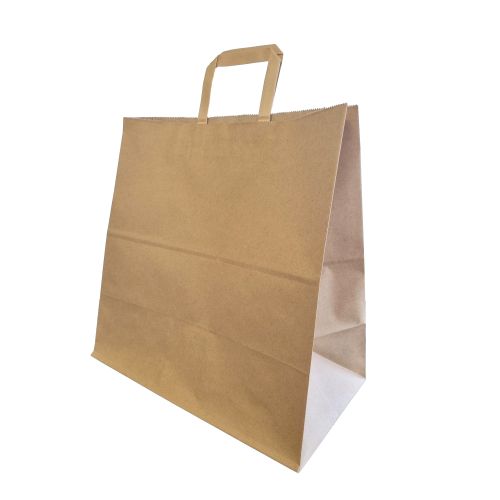In recent years, businesses worldwide have increasingly embraced sustainable alternatives to traditionally single-use products. One of the most significant shifts has been the widespread transition from plastic bags to paper bags across supermarkets, retail stores, and the takeaway food industry. “Companies are setting goals to reduce their environmental impact, and using paper bags shows their dedication to this critical issue to their customers,” explains Bunzl Australia & New Zealand Category Manager Connie Celis Izaguirre.
While paper carry bags are known to be less durable and more susceptible to moisture in comparison to a plastic bag, innovations and advancements by paper manufacturers around the world are resulting in paper bags more specifically suited to a wider range of products in the retail and hospitality sectors.
Innovations in recycling technologies have greatly improved the quality and usability of recycled materials, allowing a product to be kerbside recyclable in Australia, while also being made from quality 100% post-consumer FSC-certified recycled paper.
Smart automation technology is also transforming the industry by integrating advanced machinery and systems that streamline production processes and enhance efficiency. These automated solutions include precision cutting mechanisms, automated quality control, and smart sensors for real-time production monitoring to obtain a high-quality sustainable product.
SOLUTIONS MUST BE DURABLE AS WELL AS FUNCTIONAL AND OPERATIONAL
For hospitality operators, in particular, practicality is paramount. The strength and weight-bearing capacity of paper bags can have a direct impact on operational performance and customer satisfaction. Bags that feature flat handles and kraft paper construction, for example, exemplify how intelligent design enhancements – e.g. reinforced gussets and flat bottoms – can imbue them with incredible durability and greater carrying capacity.
“The weight a paper bag can hold depends on the quality and thickness of the paper used,” advises Celis Izaguirre. “Selecting the appropriate paper weight in collaboration with our supplier ensures our bags can handle the intended load without tearing. Many tests are performed, like the bursting strength test and tear resistance test, to help determine how much force a paper bag can withstand. Not only does that ensure our products are made with high level craftsmanship Discover Sustain’s paper carry bags with flat handles here. and adequate specifications, but also that our products are FSC® (FSC®-C117930) certified to ensure our product supports responsible forestry.”
The Forest Stewardship Council® label on the paper carry bags ensures responsible use of the world’s forest resources. FSC® is a global, not-for-profit organisation dedicated to the promotion of responsible forest management.
LOGISTICS AND STORAGE EFFICIENCY
Storage and logistical efficiencies are also big considerations, especially for high-turnover businesses like restaurants and retail stores. Well-designed paper bags must be foldable and stackable, as well as be able to fit multitudes into small spaces. Having a provider that produces paper bags in multiple sizes can also be a game-changer in the switch from plastic to paper. In all things, thoughtful design can facilitate smarter inventory management without compromising on strength or useability.
END-OF-LIFE CONSIDERATIONS
An often-overlooked factor is the end-of-life recyclability of paper bags. Education about proper disposal and recycling practices is therefore of the utmost importance in order to maximise sustainability for the long term.
Paper-bag suppliers that can guarantee compatibility with co-mingled recycling streams are becoming an increasingly preferred option among business owners in Australia and New Zealand. And looking towards the future? As more businesses turn towards sustainable alternatives for their packaging, newer types of sustainable bags will hit the market to address more specific needs.
“While paper bags are a great packaging solution in the retail and hospitality sectors, I believe we will see a future trend emerging towards the use of other renewable and organic materials in carry bags,” says Celis Izaguirre. “Compostable bags are becoming increasingly popular as a sustainable packaging solution that offers greater moisture resistance – especially for customers located in high humidity areas such as far north Queensland.”
As businesses continue to seek out more sustainable solutions to plastic, paper carry bags should be seen as not just the most viable option, but also the most responsible one.
